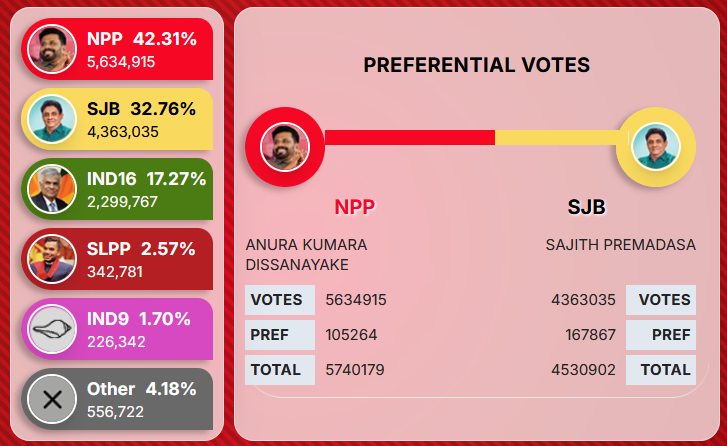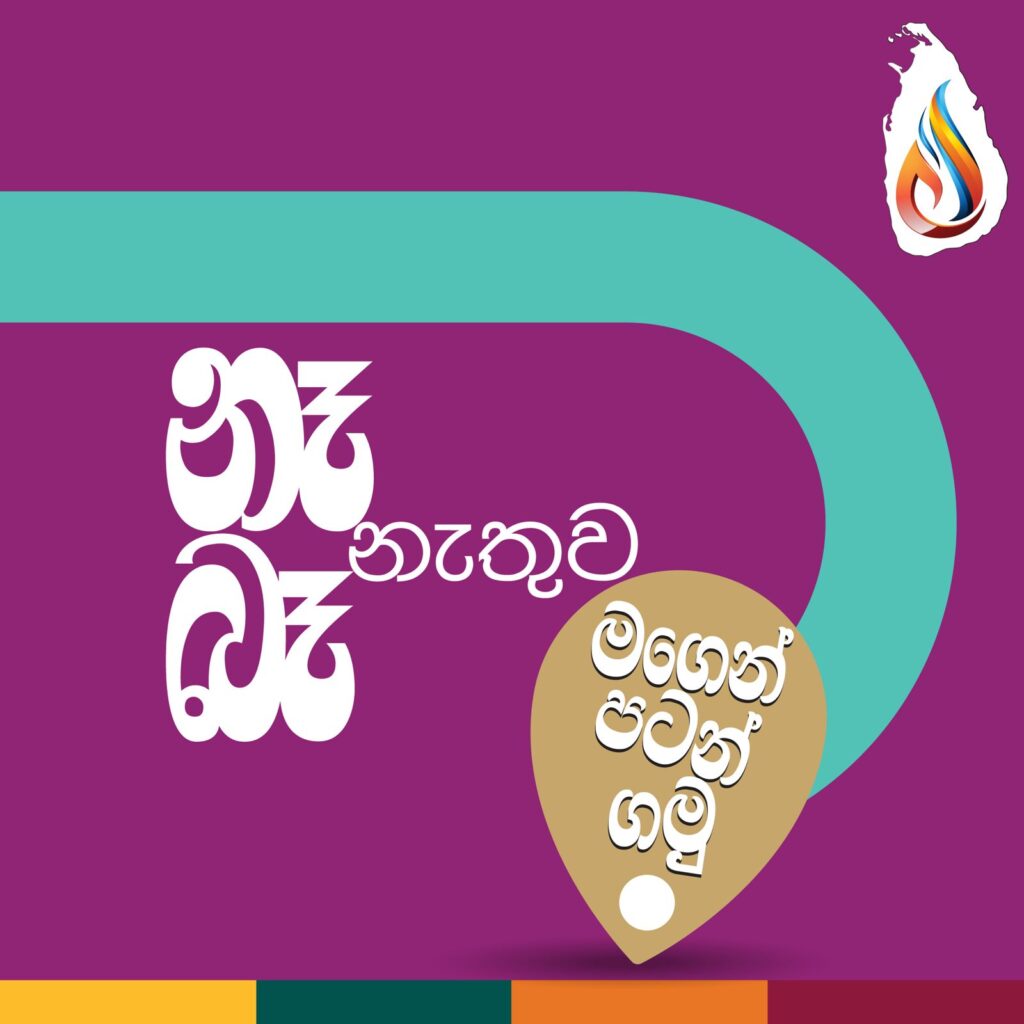By: Isuru Parakrama
September 22, Colombo (LNW): With the counting of votes being wrapped up and the results already becoming public record, the overall results of the 2024 Presidential Election of Sri Lanka officially confirm that Anura Kumara Dissanayake, the Presidential Candidate and Leader of the National Peoples Power (NPP), has become the ninth Executive President-elect of Sri Lanka, gaining a landslide victory and rewriting history as the first politician ever with a socialist and leftist background to become the Head of State of the island nation.
His emergence as the new Commander-in-Chief marks a significant milestone in Sri Lankan politics, as the 2024 Presidential Election is one of the most peaceful elections in the history and is the first ever presidential poll in the country to count the number of preferential votes to secure victory as per the Election Commission’s directives. No contender has gained a 50+ per cent voter base in the polls, compelling the Commission to proceed with this action.

Nonetheless, despite runner-up Sajith Premadasa gaining more preferential votes (167,867) than Dissanayake (105,264), the NPP Leader’s voter base has spoken for itself confirming his victory.
Dissanayake overall secured 5,740,179 votes, with a 55.88 per cent victory, underscoring his capacity to understand what is running in the veins of populus sovereignty and exhibiting his eye for audiences of all societal levels in the debt-ridden Sri Lanka.
Dissanayake, who also serves as the Leader of the NPP’s core faction ‘Janatha Vimukthi Peramuna’ (JVP) alias the Peoples Liberation Front, outlined a vision centred on political reform, economic recovery, and social justice ahead of the 2024 Presidential Election.
His key promises include eradicating corruption, establishing good governance, and promoting transparency.
President-elect Dissanayake also advocates for a sustainable economic model focused on reducing debt, boosting local industries, and ensuring equitable development.
Additionally, he pledged to safeguard citizens’ rights and improve public services, aiming to create a fairer, more inclusive society. His campaign emphasised a break from the traditional political elite, seeking widespread reform.
In stark contrast to the 3 per cent of votes secured by Dissanayake in the 2019 Presidential Election, the NPP Leader was able to develop a whole new movement in addition to the so called ‘JVP-Cadre’ – whose reputation of voluntary support lags behind ideologies harnessed from communism – within only just five years, exhibiting an outstanding development in his political prowess, hence the securing of 55.88 per cent of votes this year, which analysts allusively describe as ‘a conduit for change’ in the political landscape of Sri Lanka.
Dissanayake’s political journey began during his school years, where he became actively involved in the JVP. His participation in university student politics further solidified his role in the movement, eventually leading to his inclusion in the JVP politburo in 1995.
Since September 2000, Dissanayake has held a parliamentary seat, either through national appointments or by election. From 2004 to 2005, he served as the Minister of Agriculture, Livestock, Land, and Irrigation, and later took on the role of Chief Opposition Whip from 2015 to 2018. In February 2014, during the party’s seventeenth National Convention, he was appointed leader of the JVP.
In 2019, the JVP formed a broader alliance, and rechristened the ‘National Peoples Power’ (NPP), Dissanayake gave leadership to the assembly of more than forty civil movements under one political emblem ‘The Compass,’ swiftly swaying away from obsolete communist and / or socialist ideologies, in preference to ‘social democracy.’
Dissanayake’s solutions to issues in a contemporary manner attracted new audiences, especially the youth. In view of the national crisis leading to ethnic division amongst society and discrimination based on sexual orientation and gender identity, Dissanayake’s party categorically clings on to equality for all human beings regardless of differences.
His valuation for ‘collective effort’ rather than crowning himself as ‘the one being to resolve problems’ navigated the public’s eye towards his party’s policy manifesto. The National People’s Power (NPP) proposes a strategy to address the nation’s economic crisis. Key elements of their policy include:
- Debt Renegotiation: The NPP intends to engage in further discussions with the International Monetary Fund (IMF) to develop a robust debt restructuring plan.
- Economic Revitalisation: Their manifesto outlines plans to build a resilient social market economy by transforming the country’s political culture and focusing on increased economic participation, aiming to reduce income distribution inequality.
- Anti-Corruption Measures: The NPP emphasises the importance of good governance and the rule of law, proposing the establishment of a financial crimes investigation division to recover stolen assets by politicians and others.
- Tax Reforms: They advocate for a fairer tax system, criticising the current structure as unfair to workers, except those in the IT sector.
- Infrastructure Development: The NPP plans to undertake infrastructure projects only after assessing their economic contribution to the country at large.
Overall, the NPP, under Dissanayake’s leadership, seeks to establish a more equitable and sustainable economic system in Sri Lanka through structural reforms and increased public participation in the economy.
Dissanayake is expected to take oath as the ninth Executive President of the Democratic Socialist Republic of Sri Lanka tomorrow, September 23, 2024.


